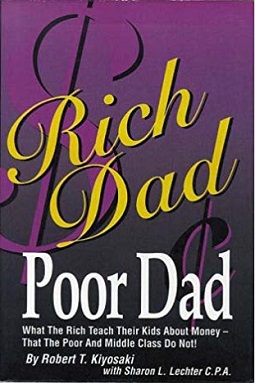“Rich Dad Poor Dad” is a personal finance and self-help book that has inspired millions of readers globally. Originally published in 1997, the book presents a narrative where Kiyosaki contrasts the financial philosophies of two father figures: his
Read More
“Rich Dad Poor Dad” is a personal finance and self-help book that has inspired millions of readers globally. Originally published in 1997, the book presents a narrative where Kiyosaki contrasts the financial philosophies of two father figures: his biological father (the “Poor Dad”) and the father of his best friend Mike (the “Rich Dad”). Through this comparison, Kiyosaki explores key principles of financial independence, wealth-building, and mindset shifts that can transform one’s approach to money.
The central theme of Rich Dad Poor Dad is the importance of financial education and the idea that conventional wisdom regarding work and money is flawed. Kiyosaki argues that schools focus too much on academic education, preparing students to become employees rather than teaching them about financial management and wealth creation. According to Kiyosaki, the poor
and middle class tend to work for money, while the rich make money work for them.
Kiyosaki presents these lessons through anecdotes and real-life experiences from his life. He describes how his “Poor Dad” was well-educated, held a stable government job, and believed in working hard to earn a salary and save money. In contrast, his “Rich Dad” was less formally educated but understood the importance of investing in assets that generate income, and he built
his wealth through entrepreneurship and smart investing.
One of the foundational principles in Rich Dad Poor Dad is the concept of assets versus liabilities. Kiyosaki defines assets as things that put money into your pocket, such as investments, real estate, or businesses that generate passive income. Liabilities, on the other hand, are items that take money out of your pocket, like loans, credit card debt, and consumer goods that depreciate in value. Kiyosaki emphasizes the importance of accumulating assets and minimizing liabilities as a pathway to financial freedom.
Another major takeaway from the book is the idea of financial independence through entrepreneurship. Kiyosaki stresses that the wealthy often create multiple streams of income through businesses, real estate, or investments, rather than relying solely on a paycheck from a job. He advocates for a shift in mindset, encouraging readers to think like investors and entrepreneurs, taking calculated risks to build wealth rather than settling for a secure, but often limiting, career.
Furthermore, Kiyosaki emphasizes the importance of developing financial literacy—knowing how money works, understanding accounting, and being comfortable with investments. He believes that the ability to read and understand financial statements is crucial to making informed decisions and taking control of one’s financial future.
The book also explores the psychological and cultural factors that shape our attitudes towards money. Kiyosaki argues that many people are conditioned to believe in traditional notions of job security, retirement plans, and saving money in a bank. This mindset, he contends, holds people back from achieving financial success. In contrast, the wealthy view money as a tool to generate more wealth, and they continuously seek opportunities for growth and improvement.
One of the most profound aspects of the book is Kiyosaki’s emphasis on the importance of taking risks and learning from failures. He believes that risk-taking and financial experimentation are essential for growth, and that failure should be viewed not as a setback, but as a learning experience. This mindset shift from fear to opportunity is central to Kiyosaki’s philosophy.
“Rich Dad Poor Dad” serves as a call to action for individuals to take control of their financial futures, educate themselves about money, and adopt a mindset of abundance and opportunity. Whether one agrees with every idea presented or not, the book undeniably challenges traditional thinking about money and offers a fresh perspective on achieving financial freedom. For those looking to break free from the rat race and achieve financial independence, Kiyosaki’s insights provide valuable food for thought.
Show Less

